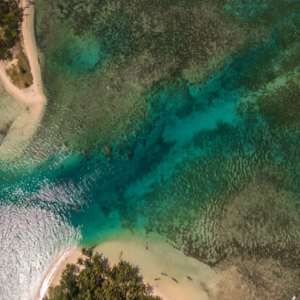Asia-Pacific: Sustainable Fishing for Climate Resilience

Nowhere in the world is as dependent on healthy fisheries as the Asian Pacific. In Kolono Bay, BMU delegates discussed with locals and experts from Rare how to make fishing more sustainable and protect coastal ecosystems to secure food and economic security across the region.
In August 2019, Germany's Federal Ministry for the Environment, Nature Conservation and Nuclear Safety (BMU) delegation led by Mr. Norbert Gorißen, Deputy Director General and Head of Directorate, International Policy (IK) and Mr. Philipp Behrens, Head of Division International Climate Initiative (IKI) and representatives from the German Embassy and the Deutsche Gesellschaft für Internationale Zusammenarbeit (GIZ) GmbH visited a Rare project site in Kolono Bay, a relatively small embayment with coral reefs and fishing villages in Southeast Sulawesi Province.
Sparking Change Across Communities and Provinces
The visit was an opportunity for BMU to witness first-hand how Germany's development assistance is building the resilience of fishing-dependent communities in the province that are vulnerable to climate change. IKI is a key element in Germany's climate financing and funding commitments to the Convention on Biological Diversity (CBD). Rare, through the Fishing for Climate Resilience project, is helping translate these commitments into action and sparking change in the community and beyond. Paula Caballero, Rare's Managing Director for Climate Change, who joined the delegation, echoes this thinking. "Governments cannot do it alone. We need to make climate change everyone's business. We need a fuller, bottom-up approach where we incentivize individuals, communities, the private sector, and others to make climate change their business."

The delegation heard from communities of Kolono Bay about positive changes that stemmed from Rare's past work, which BMU-IKI supported, to advance community-led approaches to coastal fisheries management. Over 10% of its 3,000 people are fishers, most of whom are engaged in small-scale fishing. Mr. Mabrur, leader of the Kolono Bay Care for the Sea Forum (a management body established with Rare's support in 2017 as a joint agreement among five villages), recalled how different their lives were 15 years ago. "We had to travel farther out to sea for less fish. We were unaware of how much damage we were inflicting on our lives and resources." According to Mr. Mabrur, Rare helped the Kolono Bay communities understand how their existence is intrinsically dependent on their resources, realize the value of collective action, establish exclusive fishing zones and the rights to access them, and build their capacities to manage their resources. To Mr. Mabrur, having the authority to create and implement their management plan to sustain these areas is having control over their future. "It was an empowering process," he said.
A Kolono Bay women's group also shared their related challenges and experiences working with Rare to improve their lives and protect their marine habitats. They reported having to avoid consuming fish caught in the bay because of the dynamite used to catch fish and facing more time away from their husbands, who were forced to sail farther to catch fish.
"Our lives are different now from 15 years ago. Our income has increased, and we are not afraid anymore to eat the fish our husbands catch from the bay because we know these are not contaminated." The delegation also met with heads of Southeast Sulawesi's provincial government authorities. Mr. Ali Mazi, Governor of Southeast Sulawesi Province, committed to making provincial fisheries governance climate-smart by including EbA in provincial plans and policies, and embracing Rare's integrated approach to EbA.
 Committing to and Replicating That Change Across Boundaries
Committing to and Replicating That Change Across Boundaries
Such stories are reminders that community-led and nature-based solutions such as EbA - that work at the local level and can be scaled and replicated elsewhere - are the keys to fulfilling national and global commitments to combat climate change. Replicating the work across networks of communities will advance a movement of climate-conscious fisheries management that makes its way from community-based management into national climate and development strategies and plans. This project will allow Rare to continue working with coastal communities and local leaders in Asia-Pacific to mainstream climate considerations into plans for sustainable fisheries management while increasing adaptive capacity on the ground.
The link has been copied to the clipboard
Contact
IKI Office
Zukunft – Umwelt – Gesellschaft (ZUG) gGmbH
Stresemannstraße 69-71
10963 Berlin










![[Translate to English:]](/legacy/_processed_/5/5/csm_Indien_EE_Solar_Frau_bfcf99c425.jpg)
